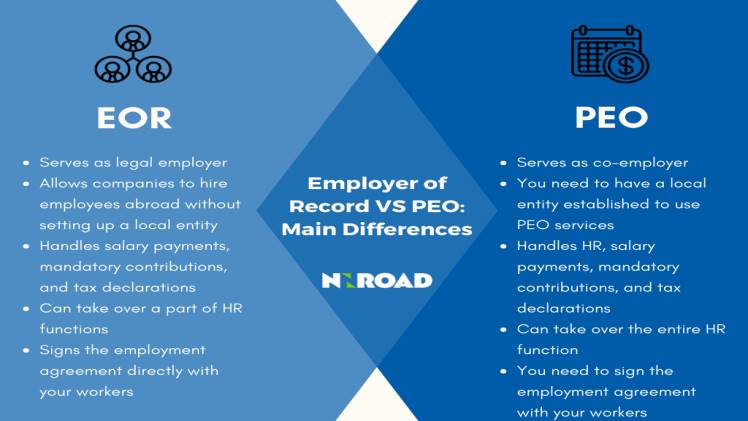Global PEO vs. Employer of Record: Understanding the Key Differences

In today’s globalized business landscape, expanding into new markets and hiring international talent has become increasingly common. However, navigating the complexities of global employment can be challenging for organizations. This is where services like Global Professional Employer Organizations (PEOs) and Employers of Record (EORs) come into play. Both options offer valuable solutions to facilitate global expansion, but they differ in their approach and scope of services. In this article, we will delve into the key differences between Global PEO and Employer of Record services, services offered by INS Global.
Key differences between Global PEO and EOR INS Global Consulting
A Global PEO, also known as an International PEO, is a comprehensive global employment solution that enables organizations to expand into new countries without the need to establish their legal entities. By partnering with a Global PEO, companies can quickly hire employees in foreign markets while mitigating legal and administrative complexities. A Global PEO essentially acts as an outsourced employer, assuming responsibility for compliance, payroll, benefits, and HR administration on behalf of the client.
On the other hand, an Employer of Record (EOR) is a localized entity that serves as the legal employer for the employees of an organization operating in a foreign country. The EOR takes care of all legal and compliance obligations, including payroll, taxes, benefits, and HR administration, ensuring compliance with local labor laws and regulations. Unlike a Global PEO, an EOR establishes a legal presence in the country of operation, becoming the official employer of record.
One of the key distinctions between Global PEO and EOR services is the nature of the employment relationship. With a Global PEO, the client organization retains a co-employment relationship with the employees, meaning that the PEO shares certain employer responsibilities. This allows the client to maintain a level of control over the employees’ day-to-day work and business operations. Conversely, with an EOR, the employees are directly employed by the EOR, creating a traditional employer-employee relationship. The EOR assumes full employer responsibilities, while the client organization maintains managerial control.
Another significant difference lies in the level of legal and administrative support provided. Global PEOs offer a more extensive suite of services, including HR consulting, onboarding assistance, benefits administration, and risk management. They act as a one-stop-shop for global employment needs, providing expertise and support throughout the entire employee lifecycle. EORs, on the other hand, primarily focus on ensuring compliance with local labor laws, payroll processing, and tax obligations. While they handle the core administrative tasks, they may not provide as much strategic HR support as Global PEOs.
The scalability and flexibility of each option also vary. Global PEOs are designed to offer a scalable solution for companies looking to expand into multiple countries simultaneously. They provide centralized management and streamline processes across different locations, making it easier to navigate complex international employment scenarios. EORs, on the other hand, are often more suitable for organizations seeking to establish a long-term presence in a specific country. They offer localized expertise and are well-equipped to handle country-specific complexities.
Cost considerations also come into play when choosing between Global PEO and EOR services. Global PEOs typically charge a bundled fee that covers all employment-related costs, including payroll, benefits, and compliance. This simplifies budgeting and forecasting, as companies have a clear understanding of the costs associated with international expansion. EORs, on the other hand, may charge separate fees for different services, depending on the country’s labor market and regulatory environment.
In summary, while both Global PEOs and EORs offer solutions for global expansion, they differ in their approach and scope of services. Global PEOs provide a comprehensive employment solution, acting as an outsourced employer and offering a wide range of services. EORs,
on the other hand, establish a legal presence in the country of operation, becoming the employer of record and primarily focusing on compliance and payroll processing. Understanding these differences is crucial for organizations seeking to expand globally, as it allows them to choose the most suitable option based on their specific needs, long-term goals, and budget constraints. Remember to contact to INS Global Consulting to find more.



